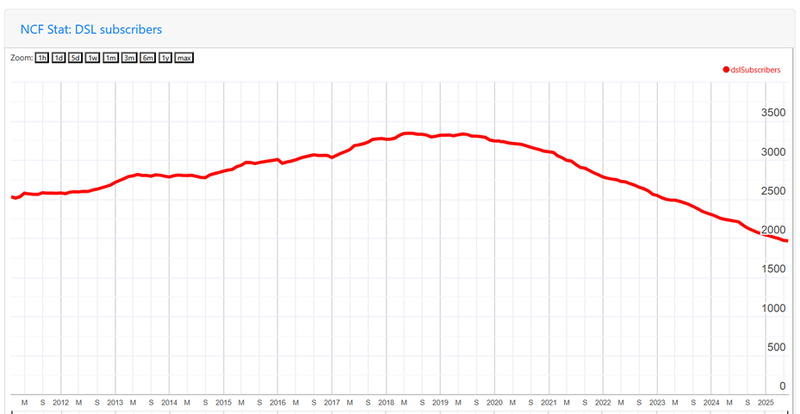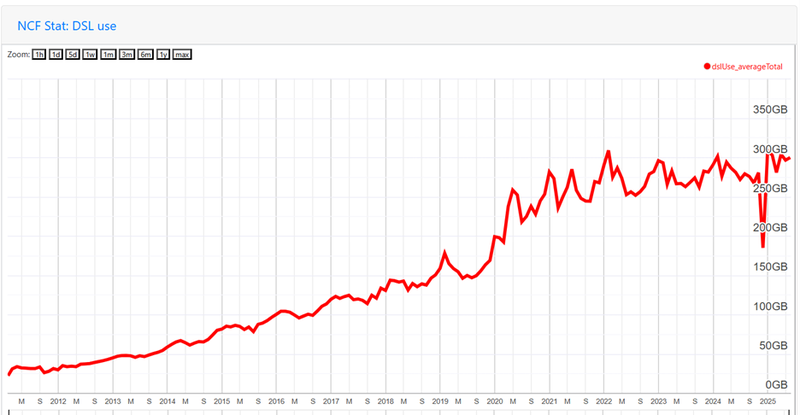Report from the Executive Director (Shelley Robinson)
Download a PDF of the 2024 ED AGM report.
Report from the Executive Director for the year ending December 31, 2024
Introduction
Looking back at NCF’s history over the last almost 33 years, there has always been a kind of plucky do-it-yourself community spirit combined with the determination of the Little Engine That Could: we think we can, we think we can. And we have! But of course, that doesn’t mean that it’s always been simple or easy.
And starting as an online community portal offering dial-up has meant a lot of changes and pivots along the way.
I think 2024 exemplifies this blend of can-do positivity and adaptability with the reality of being a small not-for-profit with a big mission working in a complicated and ultra-competitive industry.
Our work this year was dominated by two main projects: unexpectedly being told we had to move out of the Carleton Data Centre and building the first phase of our new Community WiFi project, called CommuniFi.
Both were big and important projects that should help lay a strong foundation for NCF’s future, but also sometimes competed for the time and energy of our small staff — especially when combined with the ongoing challenges we have faced for the last five years.
Here’s an overview of our work in 2024:
1) Internet Services:
- Continuing from the past few years, NCF lost a third of our DSL members since our peak in 2019. Cable internet subscriptions are growing, but not enough to make up for the losses.
- Meanwhile, average member usage continues to rise, driving up costs.
- These losses reflect larger industry trends and are largely due to artificially high wholesale rates set by the CRTC combined with years of delays in getting wholesale access to direct Fibre-to-the-Premises (FTTP) internet.
DSL members (2012-2024):

DSL usage (2012-2024):

Note: These trends also hold for cable usage.
- In 2024, NCF staff presented to the CRTC’s review of the wholesale high-speed access service framework and made additional submissions about these issues: https://www.ncf.ca/en/documents/138/CRTC2023-56-NCF-Presentation-20240213.pdf
- The number of members accessing our lower-cost Community Access Fund (CAF) plan currently available for Ottawa Community Housing tenants has remained steady. In 2024 the Board updated the 2025-2028 Strategic Plan to prioritize the growth and expansion of the CAF program, including expanding eligibility to include other groups. We are also working to be able to offer higher speeds and lower prices but face regulatory constraints.
- Despite the challenges of the pandemic, major inflation and a decade of high wholesale rates, NCF has kept our prices steady since February 2021. We’re proud of this but it’s affecting our financial sustainability. We are currently reviewing our prices and service offerings for potential changes coming in the Fall.
- The CRTC finally mandated wholesale access to direct Fibre-to-the-Premises (FTTP) internet in 2024. NCF started alpha testing this service but was constrained in offering it to members until we completed our move out of the Carleton Data Centre, which took longer than anticipated. We are starting a beta test in July and expect to launch FTTP services this Fall.
Network resilience and redundancy:
- In early 2024, we successfully navigated a 24-hour power outage at the Carleton University Data Centre. Then, after more than 30 years of partnership, Carleton University unexpectedly asked NCF to leave their Data Centre. Challenges included limited access to our equipment during the transition, strained communications, a temporary loss of network resilience and redundancy, equipment shortages and significant supplier delays. This work was finally concluded in March 2025.
- As a result of the move, NCF bought a significant amount of new network equipment and sourced additional suppliers for some of our core network services to ensure network resilience across our new data centres. Most of these changes have already been implemented but we are still refining our network design to ensure best performance and reliability.
2) Digital Equity:
NCF has always been working towards digital equity, but we didn’t always call it that. The term started gaining traction during the pandemic to capture the many elements that go into digital equity, from affordable access to the internet at home and around the community, access to connected devices, digital skills, and tools that ensure online safety and privacy.
Digital equity also reflects that while everyone has a right to basic communication tools, the digital divide disproportionately affects those who already face other barriers. This includes those living on low incomes, people with disabilities, newcomers, seniors, those in rural and remote communities, and Indigenous people, communities and nations.
CommuniFi:
While NCF’s internet services are part of our commitment to advancing digital equity, the regulatory constraints described above have made it hard to do as much as we want. As a result, NCF started talking about developing plans for a free Community WiFi network during the early pandemic. This is part of a growing global movement of community networks that bears a lot of similarities to the original Freenet movement of the 1990s. We have called our new community network CommuniFi.
- After years of reports and grant applications, CIRA came on board with a $250,000 grant for a pilot project serving Vanier, Overbrook and parts of Sandy Hill and Lowertown. We partnered with Ottawa Community Housing (OCH) and Hiboo Networks, a subsidiary of Hydro Ottawa, on this work. CBC Ottawa’s All in a Day covered the project announcement: https://www.cbc.ca/news/canada/ottawa/free-internet-ottawa-community-housing-1.7096280
- We built a supernode to bring backhaul connectivity from the ground floor to the roof of 251 Donald Street that can beam internet to community organizations within a 5km range.
- We also connected the first two CommuniFi sites, offering free WiFi with speeds up to 850Mbps in the common spaces inside and up to 300 feet outside 251 and 255 Donald Street, two OCH apartment buildings that house 400 tenants and also host a range of community services. Launched in December 2024, the network was accessed by almost 2000 devices in its first six months.
- Check out the video about the project: https://www.youtube.com/watch?v=P7Y8cHRaCkc
Volunteer recruitment and training:
Thanks to funding from the Ontario Trillium Foundation, we were able to hire longtime HelpDesk Analyst Luke Deschenes as a dedicated Volunteer Recruitment and Training Coordinator. As part of his work, Luke:
- recruited more than 100 volunteers, of whom more than 10 continued through the training to join the HelpDesk.
- re-launched our Lunch and Learn series for staff and volunteers and updated our volunteer training
This work is now being continued by Lana Wilson in her role as HelpDesk Analyst, Volunteer Recruitment and Training Lead.
Workshops:
Also with support from the Ontario Trillium Foundation we offered a few workshops in 2024 as we build back our capacity to pre-pandemic levels. This included:
- a webinar on urban community networks and internet speed offered in partnership with CIRA: https://youtu.be/_7i40-0AjxM?feature=shared
- a workshop on how to use an open-source password manager, offered online and in-person at the Pinecrest-Queensway Employment Services Centre by Chris Taylor of the Ottawa PC Users Group
- an online panel of experts discussing Misinformation, Disinformation and Fake News
Advocacy:
In addition to our CRTC presentation and submissions about the wholesale internet system, we also:
- following our own July 2023 submission to the Commission’s review of its Broadband Fund, we helped 307net, another local not-for-profit internet provider, submit to the same process.
- spoke at CIRA’s Connected Canadians member event